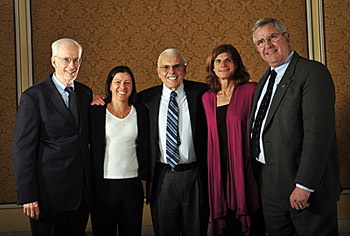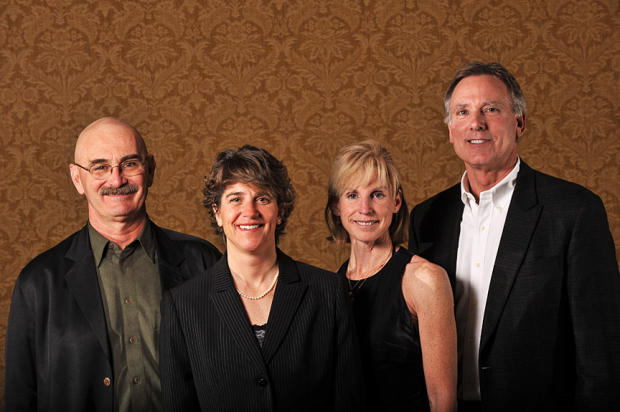The Man abides
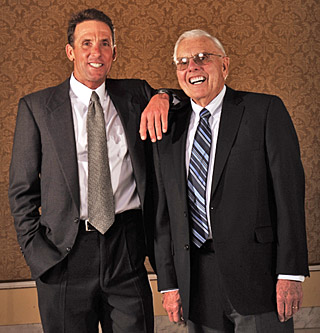
It’s been thirty years since Dave Scott came out of the plains of Davis, California to put his stamp of excellence on the fledgling Hawaiian Ironman Triathlon. From 1980 through 1987, he won six Ironman titles and won five epic clashes with his eventual successor, Mark Allen. In 1989, everyone knows that Scott's Iron War with Allen at Kona was the greatest duel in the history of the sport’s greatest race.
But Scott’s encore second place finish to Greg Welch at Kona in 1994 at age 40 and his fifth place finish there in 1996 at the age of 42 were signs that his drive for excellence transcended the usual boundaries of age and decline. Just to look at Scott’s tanned form-follows-function physique in those years and you wished that the ancient artists who created the Greek friezes depicting the classic lines of the original Olympic athletes could be called back to memorialize Scott.
Scott’s look was the living proof that triathlon might well be the closest thing that we could find to Ponce De Leon’s fabled Fountain of Youth.
But just last year, good and bad came knocking on Dave Scott’s door. Just as he and women’s Ironman sensation Chrissie Wellington started a coaching relationship, Scott was hit by a car while riding on a Boulder road and was severely injured. The crash crumpled one of humankind’s most perfectly tuned athletic bodies like a masterpiece painting that had been accidentally torn by a falling museum scaffolding. He suffered pulmonary embolisms and struggled to breathe whenever he pushed hard. His ribs, legs, and broad shoulders were damaged and he struggled to swim, bike and run with constant pain and imperfect wings and wheels because he loved his sport so much.
This month USA Triathlon announced that Scott would be inducted into its third Hall of Fame class early next year with good friend Dave McGillivray and fellow Team in Training coach Susan Bradley-Cox. His work with Chrissie Wellington was going well as she set two world bests at the Ironman distance at Roth and broke Paula Newby-Fraser’s 17-year Ironman Hawaii race record before a last minute virus derailed her attempt at a fourth straight Ironman Hawaii win last month.
Right now, Scott is cheering his two sons and a daughter in their athletic ventures and has worked hard to whip his battered body into shape for a go at the half Iron distance Savage Man next year. He spoke with Slowtwitch this week.
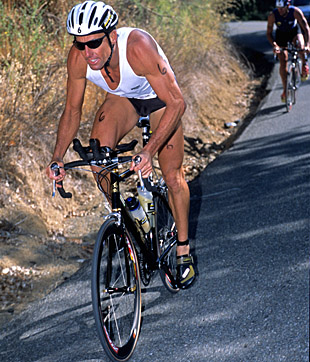
THE HONOR
Slowtwitch: How does it feel to be a USA Triathlon Hall of Famer joining your dad Verne?
Dave Scott: It’s a great honor to follow in the footsteps of my dad and the honorees of the first two years.
ST: What was it like to introduce your father to the first USAT Hall of Fame banquet audience in 2009?
Dave: That was quite fun for me. He was instrumental in starting USAT which was called Tri-Fed back then. It was great to see some of the old cronies that had been involved in the sport quite a while ago and it was a lot of fun to sit back and chat with those folks. This year I will be inducted, along with Dave McGillivray and Susan Bradley-Cox.
ST: Looks like you are the first elite male competitor inducted.
Dave: I’m not real sure what criteria it is. But when I look at Dave McGillivray, our history goes back to the 1980 Ironman. He has an uncanny passion and a phenomenal amount of energy and integrity and honesty. He has just a phenomenal history and resume of providing service to the sport. His annual birthday run has raised millions of dollars for charity and his promotional energy has contributed to and supported a wide variety of charities and activities in the sport as well as participating in many incredibly individualistic events [such as running across America and] finishing the Boston Marathon course every year at night after his race directing duties are done.
ST: Dave McGillivray is much more than an acquaintance to you.
Dave: He represented me for a while as an agent. It was more a friendship thing but he was very good at it and we had a great rapport. I remember doing one of his races, The Bay State Triathlon, in the mid ‘80s and I didn’t think he slept for 3 or 4 straight days in and around that race. I won it that year and he said 'We don't have a really big prize purse.' Frankly I wasn’t used to it. But I won a set of golf clubs. Fortunately I play golf intermittently and I do have those golf clubs to this day. That was quite an award. Dave also put on a popular triathlon series and was involved putting on the triathlon at the Goodwill Games. That was a big event. And he’s taken on controversial sides in drafting legislation and served on the technical committee of ITU for a while. Dave is well known in the industry and as the race director of the Boston Marathon and for the work he has done for the Jimmy Fund. So Dave has had an incredible impact. Dave is older than I am by 6 months. I remind him of that every year. And he has two young kids. Which is nice, but I don’t know how he’s managed to take on all that.
ST: You also know Susan Bradley-Cox.
Dave: She is very well known and she has won national age group and Hawaii titles many times. She has also been involved with Team in Training, as I have, as a national coach since ’99. She came to one of Team in Training coaches conferences I conduct. She is soft spoken, very humble and a great representative of the sport.
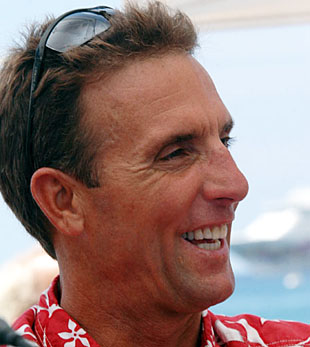
COACHING CHRISSIE WELLINGTON
ST: How did you come to advise and help coach Chrissie Wellington? She had a spectacular start with Brett Sutton, briefly signed on to work with Cliff English, changed her mind and had a short stint with fellow Boulder resident Simon Lessing.
Dave: Well she had some twists and turns with her coaching and started to come out to my swim class in the spring of 2009 at Flatirons in Boulder. Of course I knew her – we had spoken at past events. But I didn’t know her when she was winning her first Ironman Hawaii and I was there doing commentary. She seemingly enjoyed the swim class and my style of coaching and we just started to talk a little bit about her program. As we chatted more, I could see she obviously had a good training program and nutrition system.
ST: So when she asked you to coach her, how did you approach things?
Dave: Like a lot of the world’s best, if you try to over coach them you will likely develop the wrong rapport and can lead them down the wrong track. You must see what they do and odds are what is needed is to tweak and modify a bit. Your main goal is to make sure they have steady development and progression. You want them to build in rest as well so when the gun goes off they have all their weapons.
ST: If you started in mid-2009, it looks like you had a good influence. Chrissie set a new world best at the Ironman distance at Roth and broke Paula Newby-Fraser’s 17-year-old race record at Kona. From the outside it seems as if things must have gone incredibly smoothly.
Dave: She had a few hurdles going into Hawaii. She had an injury but was able to gut it out on the run. On paper, it looked like she had a great day. But I knew, and she knew, and I told her in my ever-candid, callous style, that she didn't have her best day.
ST: How can that be? She broke records. Or is she simply the Brett Favre of triathlon, playing great through pain and injury? I know that several Ironman observers said she looked like she was struggling on the run in Hawaii and really got every ounce out of herself that day.
Dave: She has an uncanny tenacity. Her upper hamstring was bothering her last year. When you finally get down close to the day, you have put in an extraordinary amount of time in hours and months of training, and so every athlete has niggling things wrong with them. No one says “I feel flawless.” But there is a fine line of overdoing it, and that opens issues with muscular-joint-tendon-and connector tissue. Leading into that race, it was a matter of restoring her confidence and extracting the best plan for that race so she would not be necessarily dependent on last 15k of the run. Deep down inside, she had a bit of a struggle in 2009.
ST: How did you help guide her through rehab from that January 2, 2010 arm and wrist injuries she suffered when she fell on an icy road during a bike ride back in Great Britain?
Dave: That obviously shortened the front end of her season. We are all creatures of habit and she had grown accustomed to being at a certain point of fitness in March. So it was a big problem that she could not exercise to the level at the date she had grown accustomed and her fitness was compromised a little in some respects. But there were some good things about it and she recognized that. She was still able to run to some degree on an indoor trainer and during her time off she became not quite so consumed about following the template from previous years.
ST: But how did you get her ready for what turned out to be an historic performance at Roth?
Dave: There was also a sense of urgency to get her as fit as we could when she had to skip some early races before Roth. So when she arrived here in Boulder in April, she pushed her schedule a bit. She had done great homework and there was a little bit of anxiousness in getting her fitness up to a CHUCKLES high level before that race. In some ways you can’t expedite training just to force the issue. She is very numbers driven, speed driven and pace driven and she knows the game.
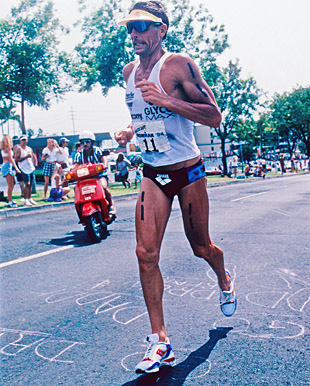
ST: So how did you know, and she have confidence, that she was ready? She just had one race (Kansas 70.3) in June and did well but didn’t set any records.
Dave: When she is on, she intuitively knows it. When she is locked into a certain tempo on 100 repeats in the pool and when she is capable of consistently good time trials, she knows she will have a good race. But this time she didn’t know how good she was going and it took a while get to a point where she knew this was going to go well.
ST: Was she nervous going into Roth?
Dave: Sure she was a bit nervous. I mean it was an historic day for the sport and an epic day for her (Wellington set a new world best for the distance with an amazing 8:19:59), but to me it was a very solid race for mid season. Going into the lead-up to Hawaii, I felt with two and a half to three months in between those races she was going to improve on last year. And I felt her potential, if she hit that kind of a day in Hawaii, would be in new record territory. But obviously it didn’t happen.
ST: You have had some experience in pulling out of Hawaii the day of the race.
Dave: In 1988 I was ready to race but had knee issues and I felt I had to run the morning of the race to see how it felt. I felt very tentative about it the whole week of the race. Ultimately it was just too sore and I decided I couldn’t do it and pulled out. Ultimately she decided to do the same thing. For me it was the right decision and it was right for her, yes.
ST: What was it like when she called and asked your advice at 4 AM Hawaii time on October 9?
Dave: I was here [in Boulder] as you know and choreographed my day to be in contact with her and her close partner and other people on the island and I also planned to keep tabs online. I was sitting with my computer open at 8 AM my time and 4 AM Hawaii time and her name popped up on my cell phone. Before I picked it up, I thought ‘She doesn’t need to call me. I would not call me.’ So I was nervous about picking up the phone. I think our last contact had been at 10 AM Friday and everything seemed OK. As she told me, by mid afternoon Friday she started to have difficulty. Her first symptoms were an extraordinarily tight throat and overall fatigue.
ST: How did the conversation go?
Dave: We just talked about how extremely difficult this decision was. Do you do it feeling like this? Do you think you can extract one of the greatest days? And if so you may be tempted to try to get through this race. Anyone who is a world champion goes into Hawaii thinking you have to be 100 percent. You’re the target. She knows what it is like to push herself to that level. My feeling was that she would get through on her natural gift and a little reserve for three and a half to four hours, then…. contrary to what people think, she is human … and her body would shut down. We kind of wrestled with it and I asked about a few more symptoms, how she felt. The more I heard, the decision became more obvious. I asked her what she would do if she felt like this and she were set to go out and train. She rarely takes a day off. She said she would not train. I said ‘That’s your answer. If you felt like this, your body needs rest and unfortunately it falls on what promised to be another epic day.’ Who knows what she might have done? She was ready to race. It was definitely excruciating for her to say no.
ST: How enjoyable is it to coach someone as rare as Chrissie Wellington?
Dave: First off, I think the most enjoyable element of working with her is that she is a great individual and she is just not myopic about training and racing. She has other interests. It’s a good diversion from too much focus on the sport. So I like to see someone a little more of a whole person. She has characteristics I am familiar with — she is type A, stubborn in a lot of ways. At times I see a lot of myself in her. So it becomes a great puzzle and a challenge to work with her and have her continue to improve.
ST: I would imagine it is a little bit like being handed a Rembrandt. Don’t want to be a bull in a china shop.
Dave: To start with I had to listen and not step in and quickly suggest ‘I think you should do this or that.’ I think it was important for both of us to develop a rapport and confidence in each other. I can be pretty forthright when I think she is a bit off track. And she tells me when she disagrees. Then I listen and think about it. I do not dig my heels in and say ‘I am right.’ That is the wrong approach with her. In fact, with every athlete, including amateurs who have reached some level of success, it is far better to listen to find out why they are successful. I really enjoy the intricacies of physiological adaptation and the psychological and emotional pieces of preparation, as well as other elements like strength training and nutrition. If she gets all these elements lined up, we don’t know what her limits are. I don’t think she has achieved that yet. But we are getting closer.
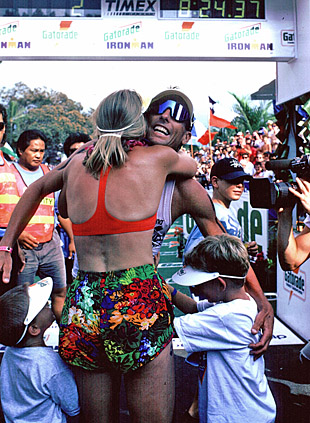
THE ACCIDENT
ST: I have heard that your 2009 accident in which a car hit you in Boulder caused far more damage than many people are aware of.
Dave: My accident was May 17, 2009. It was a year and a half ago. So yeah, I’d say that was a life-changing event for me that no athlete can really prepare for. It was a setback with lasting repercussions that remain out of my control.
ST: There are a lot of triathletes injured on bikes. No matter how careful you are. You just hope it’s the usual cuts and bruises or minor breaks.
Dave: We all get abrasions and take some good dings on the knees and head and once in a while break a bone and have 4-8 weeks of injury recovery. But my compromises as a result of the accident are still greatly affecting me today. I had multiple fractures of the hand and wrist and I have never regained movement in my ring finger. It sticks up half inch higher than the rest and my finger top is half an inch from my palm. My wrist is extremely tight, and my scapula shattered and I still can’t lie on it at night. In addition, as a result of the shattering, all the muscles around the interior border of the scapula are completely atrophied. I still have not regained strength there. I still have knots around it.
ST: How much has long term rehab and other treatments done to improve things?
Dave: I continue to do everything I can in the gym to get it back, but it’s not there. But the single biggest issues have been two blood clots in my lungs. A pulmonary embolism like that lays down scar tissue. I have been tested for lung capacity and that is greatly impaired. The doctor says that scar tissue may over time break down but right now I have a very hard time breathing heavily.
ST: That seems to be a requisite of triathlon. What are you able to do at this point?
Dave: Fortunately I am able to do all three sports of triathlon. I still have a passion for all three, but I am kind of hobbled from some residual heel stuff from the injury. This morning, I hobbled 10 miles and swam a 4200 meter workout, and I rode 60 miles from the weekend. So I am able to do all three and it makes me feel good.
ST: What is it like for you in workouts with people you coach, workouts you led for years?
Dave: I’m easy fodder in the pool. I hang on the back as long as I can with the fast folks and I fight like crazy to hang on. I am a lot slower. But that is life. That is OK. Fortunately my brain is intact and my sense of humor is too. Things seem to be getting a little better, and I hope that at some point I may take deep breaths when I struggle on the run or in the pool and not have to pick my head up and feel I am overly exaggerating. When I inhale I feel like I’m at 14,000 feet altitude but I am slightly better now.
ST: Is it too much to hope that you might come back to a big race?
Dave: On the surface, you might think ‘Why not come back and pick an event and do it?’ Part of it is I cannot control the issues I just discussed. I could certainly do a triathlon. But I would be greatly compromised and my ego says I want to perform better than that.
ST: I’ve heard you took part in a sprint race where you did a coaching clinic?
Dave: I went to the River Cities Sports Spectrum race in Shreveport. It is a regional race, a fun event and this was the 30th year for that race and I’ve been there six times. It’s a short race, a very fun race. I did fine out of the water and I had an OK ride and rode with a guy who eventually won. Of course he dropped me at 8 miles. Then I came into T2 third and chatted with folks for a while until a wave of guys were coming in and dropped me to 11th. I think I maintained my slot in 11th place. I had no issues with the 1 hour 20 minute race, and I think some day I may do a half.
ST: So where might you race next?
Dave: I am planning to do the Savage Man [a half Ironman distance with a very rugged bike.] I was unable to make it there this year, but I am headed back there next year and if I can get to the run feeling OK I will do the whole thing.
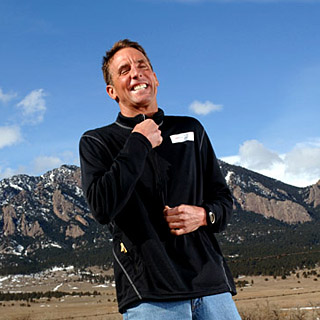
HIS MOST IMPORTANT LEGACY
ST: What are your three kids up to in the world of sports?
Dave: Both Ryan and Drew attend Montana State University. They are Nordic skiers and compete at a high level. The older one, Ryan, did the NCAAs for Montana State. Independent of the downhill events the team won overall on the second day of Nordic ski racing. It’s a good team.
ST: Triathlon?
Dave: Now they both have the bug. My middle son Drew is 19 and he really has an interest in triathlon. He did a sprint race in Boulder and had a flat at the [Boulder] Peak and fell apart in the run of the half. He was humbled in that one. But he signed up for Lubbock 70.3.
ST: Do your sons take coaching from you? Are they sort of reluctant to try it because you are so famous in the sport?
Dave: I can advise my kids — they do listen now. I can talk to them about nutrition or workload and things like that. I think they recognize my accomplishments, my history in the sport. As far as I can surmise, my accomplishments are never an issue with them. I hope it never is. Even though people will say things to both of us, my sons are dynamic in their own ways. Their personalities are strong enough to override any comments made. But my daughter Kara, who is 14 and does a lot of different sports, just might be the best athlete of all.


